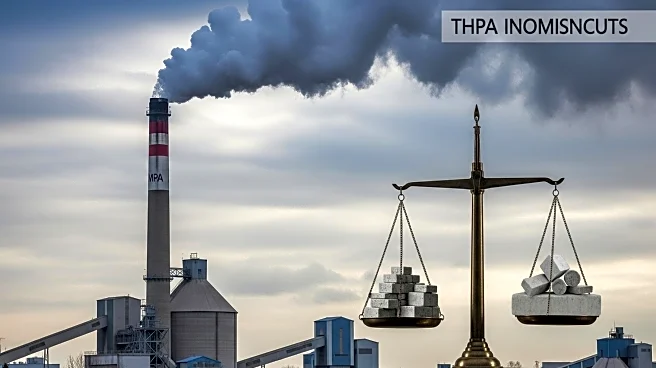What's Happening?
The UK concrete and cement industry has significantly reduced its CO2 emissions, achieving a 63% reduction from 1990 levels, according to a report by the Mineral Products Association (MPA). This progress is attributed to decarbonization efforts, including the use of low-carbon materials and technologies like Carbon Capture, Use, or Storage (CCUS). However, the MPA warns that the increasing import of cement, which now constitutes a third of the market, poses a risk to the UK's low-carbon construction goals. The shift in production to countries with less stringent environmental regulations effectively offshores emissions, undermining domestic efforts to achieve net-zero targets by 2050.
Why It's Important?
The developments in the UK cement industry highlight a critical challenge in global efforts to reduce carbon emissions: the risk of offshoring emissions. As the UK strives to meet its net-zero targets, the reliance on imported cement from countries with lower environmental standards could negate domestic gains. This situation underscores the need for policies that support local production of low-carbon materials and ensure that imported goods meet similar environmental standards. The implementation of a Carbon Border Adjustment Mechanism (CBAM) could help level the playing field by imposing equivalent carbon costs on imports, thus protecting domestic industries and jobs while maintaining environmental integrity.
What's Next?
To address the challenges posed by rising imports, the UK may consider implementing a Carbon Border Adjustment Mechanism (CBAM) to ensure that imported cement is subject to the same carbon costs as domestically produced materials. This policy could help maintain the competitiveness of UK manufacturers and support the transition to a low-carbon economy. Additionally, continued investment in technologies like CCUS will be crucial for further reducing emissions in the cement sector. Stakeholders, including government bodies and industry leaders, will need to collaborate to develop strategies that balance economic growth with environmental sustainability.
Beyond the Headlines
The situation in the UK cement industry reflects broader global challenges in achieving net-zero emissions. The potential offshoring of emissions raises ethical questions about the responsibility of developed nations to lead by example in reducing carbon footprints. It also highlights the importance of international cooperation in setting and enforcing environmental standards. As countries work towards their climate goals, the need for transparent and equitable policies that prevent the shifting of emissions across borders becomes increasingly critical.









